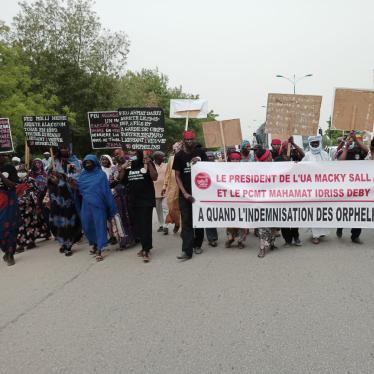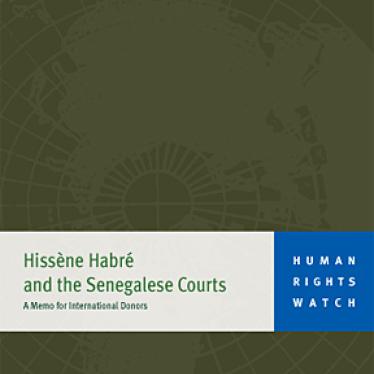(Dakar) - A new study shows that Hissène Habré, the former dictator of Chad, was well-informed of the hundreds of deaths in prisons operated by his political police, a coalition of human rights organizations said today. The announcement came on the eve of the 10th anniversary of his indictment in Senegal.
The study by the Human Rights Data Analysis Group (HRDAG) is based on thousands of documents generated by the Documentation and Security Directorate (DDS) - the state security force that pursued opponents and operated notorious prisons during the Habré regime. The files were discovered by chance by Human Rights Watch in 2001 at the abandoned Security Directorate's headquarters in N'Djamena, the Chadian capital.
"The evidence shows that Habré was not a distant ruler who knew nothing about these crimes," said Jacqueline Moudeina, president of the Chadian Association for the Promotion and Defense of Human Rights, who is also a lawyer for the victims. "Habré directed and controlled the police force, which tortured those who opposed him or who simply belonged to the wrong ethnic group."
This information could be critical in the long-delayed prosecution of Habré, who has been accused of killing and systematically torturing thousands of political opponents during his rule in Chad, from 1982 to 1990, the groups said. The announcement came from the Chadian Association for the Promotion and Defense of Human Rights (ATPDH), the Chadian Association of Victims of Political Repression and Crime (AVCRP), the Chadian League for Human Rights, the African Assembly for the Defense of Human Rights (RADDHO-Senegal), the National Organization for Human Rights (ONDH-Senegal), Human Rights Watch (HRW), the International Federation of Human Rights (FIDH), and Agir Ensemble pour les Droits de l'Homme.
Habré was first indicted on February 3, 2000 by a Senegalese judge, but the charges were thrown out on a technicality. In 2006, Senegal agreed to an African Union (AU) mandate to prosecute Habré, but it has refused to act until it receives €27.4 million from the international community, its estimate of the cost of the trial.
"It's been 10 years since Senegal first indicted Habré, but in these 10 years, thousands of my fellow survivors have perished and we are no closer to Habré's trial," said Souleymane Guengueng, 59, who almost died of dengue fever during two years of mistreatment in Chadian prisons. "Unless Senegal acts soon, there won't be any victims left at the trial."
The analysis of prison documents reveals that there was a direct superior-subordinate relationship between Habré and his appointed Security Directorate leadership and that Habré was well-informed of its operations. This analysis shows that Habré received 1,265 direct communications from the agency about the status of 898 detainees. A total of 12,321 victims are mentioned in the documents, including 1,208 who died in detention.
"Our analysis of document flow encompasses more than 2,700 administrative records, which together illustrate a clear communication and command link between President Habré and his political police," said Romesh Silva, senior demographer for HRDAG and lead author of the report. "Our findings also confirm earlier qualitative accounts of prisoner conditions and high mortality within the DDS. Perhaps most compelling is the fact that the information gathered by the DDS and Habré to document their own abuses can now be used to hold them responsible for their actions."
Under international law, individuals can be found criminally responsible for serious human rights violations if they knew or should have known that forces under their authority or control were committing crimes and failed to act to prevent the crimes or punish those responsible.
Senegal has said that it will not move forward with the case until it receives full international funding for all the costs of the trial. Senegal's estimate of €27.4 million includes €8 million to reconstruct a courthouse. The European Union, Belgium, France, the Netherlands, and Switzerland have publicly or privately agreed to help finance the trial, but are waiting for a "credible" budget. Chad has offered €3 million as an "initial" contribution. In December 2009, a joint team from the European Union and the AU visited Senegal and is expected to propose a revised budget for finally bringing Habré to trial.
In July 2006, the AU mandated Senegal to prosecute Habré "on behalf of Africa." The upcoming AU summit of heads of state and government in Addis Ababa from January 31 to February 2 will consider a progress report on Senegal's preparations for the case. Habré's victims, and their supporters, called on the AU to press Senegal to move forward.
"The failure to prosecute Habré is a shame on Africa," said Dobian Assingar of FIDH and honorary president of the Chadian League for Human Rights. "This case is a golden opportunity for Africa to show that is capable of fighting against impunity. Instead Africa is failing its victims."
Habré's victims will mark the 10th anniversary of the indictment with a series of activities in N'Djaména.
About HRDAG
The Benetech Human Rights Data Analysis Group develops database software, data collection strategies, and statistical techniques to analyze large-scale human rights violations. Based in Palo Alto, California, HRDAG has worked with nine truth commissions, international criminal tribunals, and non-governmental human rights organizations around the world. HRDAG incorporates information technology and scientific methods to create an accurate historical record of past conflicts and provide evidence to hold perpetrators accountable. See http://www.hrdag.org.







